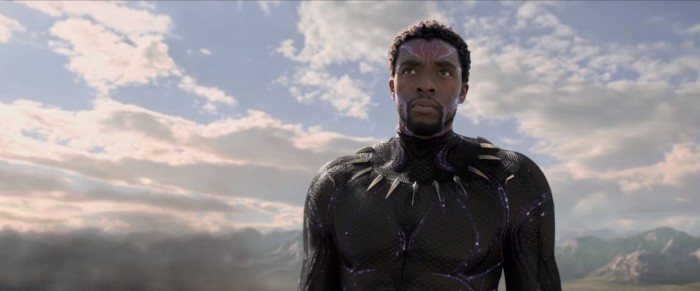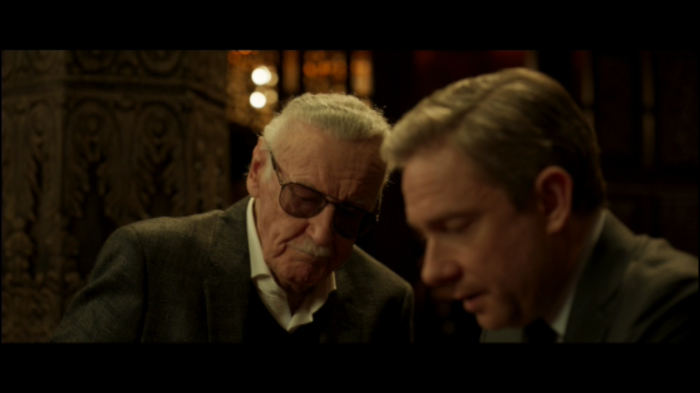
Spoiler warning: these reviews reveal plot twists.
Having taken over as ruler of Wakanda, King T’Challa – aka the Black Panther – faces a challenger from his family’s past…
Black Panther is a marvellous showcase for Afrofuturism, an aesthetic that combines African-influenced art with technological motifs. Many scenes dazzle with costumes, sets, make-up and CG-created backdrops that show off this bold, beautiful, colourful look, and it gives the film a tone and mood different from any other movie of its type. As a new-to-Hollywood explosion of design it’s comparable to Blade Runner’s use of futuristic film noirism in 1982. You can feel the fresh air blowing through the genre, and this is indicative of the whole movie.
After 17 consecutive films in the Marvel Cinematic Universe built around white, male lead characters, here – pointedly, unashamedly, gloriously – is a story about black characters, featuring a mostly black cast and made by a black director. It certainly paid off financially: at the time of writing, Black Panther is the highest-grossing solo superhero film ever, the highest-grossing film made by a black director, and the ninth highest-grossing film of all time. Thankfully, it’s an enjoyable watch too.
The story begins a week after events seen in Captain America: Civil War (2016). After the death of his father in that movie, the new king of secluded African country Wakanda is T’Challa (Chadwick Boseman), a dignified, unflappable man who clearly cares for his nation and takes his responsibilities seriously. He’s officially crowned after an elaborate and ritualistic ceremony, which is a scene that risks dragging the movie into po-faced territory. Thankfully, there’s some comic relief from T’Challa’s cheeky sister, Shuri (a sparkling Letitia Wright), who as the story progresses acts as Q to his James Bond. The king also has an entertainingly grumpy bodyguard called Okoye (played by Danai Gurira, who has badass form after her stint in The Walking Dead), while Hollywood old hands Forest Whitaker and Angela Bassett crop up in small roles.
But all is not copacetic is the world of Wakanda. Just like the Amazonian paradise seen in Wonder Woman – that other recent superhero film that broke free of the white-male paradigm – Wakanda is a highly developed society that has chosen isolationism. It hides away from the rest of the world, actively putting forth the myth that it’s a backwards country of farmers when it’s actually wealthier and more technologically advanced than anywhere else on the planet. It’s an odd situation in which to place your hero. Superman, Batman, the X-Men, Iron Man and the rest all risk their lives to help innocent strangers. T’Challa, however, is the ruler of a pull-the-ladder-up society. We don’t see him help a single person other than himself and his allies until the film’s closing moments. (It’s best not to ponder how many atrocities Wakanda has stood by and ignored over the years – just in Africa alone.)
But there’s a dissenting voice to this conservatism. T’Challa’s ex-girlfriend, Nakia (Lupita Nyong’o), spends her time helping women in other countries and advocates sharing Wakanda’s wealth and resources with the world. This gets the king thinking, but his aide W’Kabi (Get Out’s Daniel Kaluuya) is concerned. ‘You let the refugees in, they bring their problems with them and then Wakanda is like everywhere else,’ he says. Charming.
Meanwhile, the plot kicks off… At the Museum of Great Britain, two men overpower security and steal an ancient weapon from a display case. Surely the UK was chosen by the writers deliberately because of its colonial past, while the use of a museum is a neat comment on the West’s appropriation of African heritage and culture; we even learn that the weapon has been naively mislabelled. It’s a fun, slick sequence and it introduces the movie’s villain in style. Erik Stevens (Michael B Jordan) is an American with Special Forces experience. Within moments of showing up, he’s joined Loki, Guardians of the Galaxy’s Yondu and Spider-Man: Homecoming’s Adrian Toomes as one of the most effective bad guys in the Marvel series. There’s danger and attitude in Jordan’s performance. There’s fun too: as well as nabbing the axe, Stevens also steals a flamboyant mask from the museum just because he ‘feels’ it. Working alongside him is Ulysses Klaue (an entertaining Andy Serkis, returning from 2015’s Avengers: Age of Ultron). In another loaded reference to white oppression, Klaue has an Afrikaans accent.
When T’Challa learns that old nemesis Klaue has some Vibranium – an exclusively Wakandian mineral – and plans to sell it in South Korea, the king wants him caught and brought to justice for past crimes. We then get a sequence in Seoul that’s often reminiscent of a similar scene in the Bond film Skyfall – our heroes stalk a golden-lit casino, quipping to each other over earpieces, before the fighting begins. At this point we’re also reintroduced to CIA agent Everett K Ross (Martin Freeman), who T’Challa encountered earlier in the series and is now after Klaue for his own reasons. (When Ross and Klaue meet, it means a reunion of Hobbit actors. As someone far cleverer than me once joked on Twitter, Martin Freeman and Andy Serkis are this film’s Tolkien white guys.)
After a fun car chase, with Shuri remotely operating a vehicle from back in her lab and T’Challa suiting up as his Black Panther alter ego, Stevens nabs Klaue from under the noses of new allies T’Challa and Ross. Stevens then kills his former ally and delivers his corpse to Wakanda. We learn that – although raised in America – Erik is actually N’Jadaka, the king’s cousin, so he has a claim to the throne. And he’s a far more radical personality than T’Challa. He’s seen the hardship suffered throughout the world by people ‘who look like us’ and wants to use Wakanda’s resources to help them fight back. Swaggering into a meeting of the king’s retinue, he demands a challenge of combat. T’Challa feels he has no option but to fight; Stevens wins, seemingly kills our hero, and takes over running the country.
There’s then, sadly, a rather leaden period of the film as it tries to pretend that T’Challa is dead. (Does that cliché *ever* work in a film?) Meanwhile, Stevens starts to enact his aggressive policies, much to the chagrin of the other Wakandians. It’s a bit like those episodes of The West Wing where CJ, Josh and the others react badly as John Goodman takes over as President. No one’s happy, but they don’t feel as if they have a choice. (Perhaps a fistfight in a lagoon is not the best way of choosing a nation’s executive officer, guys.)
Eventually, after it’s revealed that T’Challa is alive (yay!), he and his friends mount a huge assault on the capital and we head into one of those loooong superhero-movie climaxes of fighting, jumping, crashing, fighting, flying, quipping, fighting and lots of CGI-ing. But you forgive the film the indulgence. Firstly because Black Panther has been – for the most part – an engaging and enjoyable action flick. But secondly because it’s patently an important movie. Hollywood has been maddeningly slow to recognise the need for diversity, and superhero films have not been immune to that. Black Panther is a proud, confident step in the right direction.
And as it nears its end, it becomes apparent that the stylish design work is not the only echo of Blade Runner. There aren’t many films where the bad guy steals the scene as he realises he’s about to die, but it happens in Black Panther. After T’Challa and Erik have fought for the future of Wakanda, the latter is mortally wounded. The king says he can get help. ‘Why?’ says Stevens, tears in his eyes. ‘So you can just lock me up? Nah. Just bury me in the ocean, with my ancestors that jumped from the ships. Because they knew death was better than bondage.’
Eight gamblers in the casino out of 10
